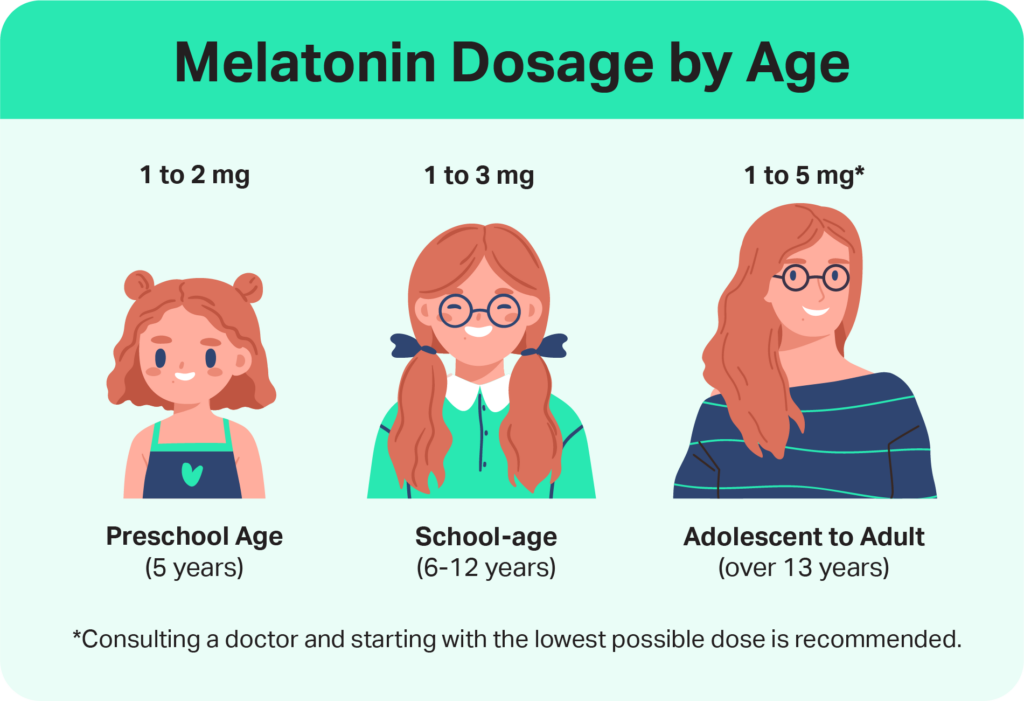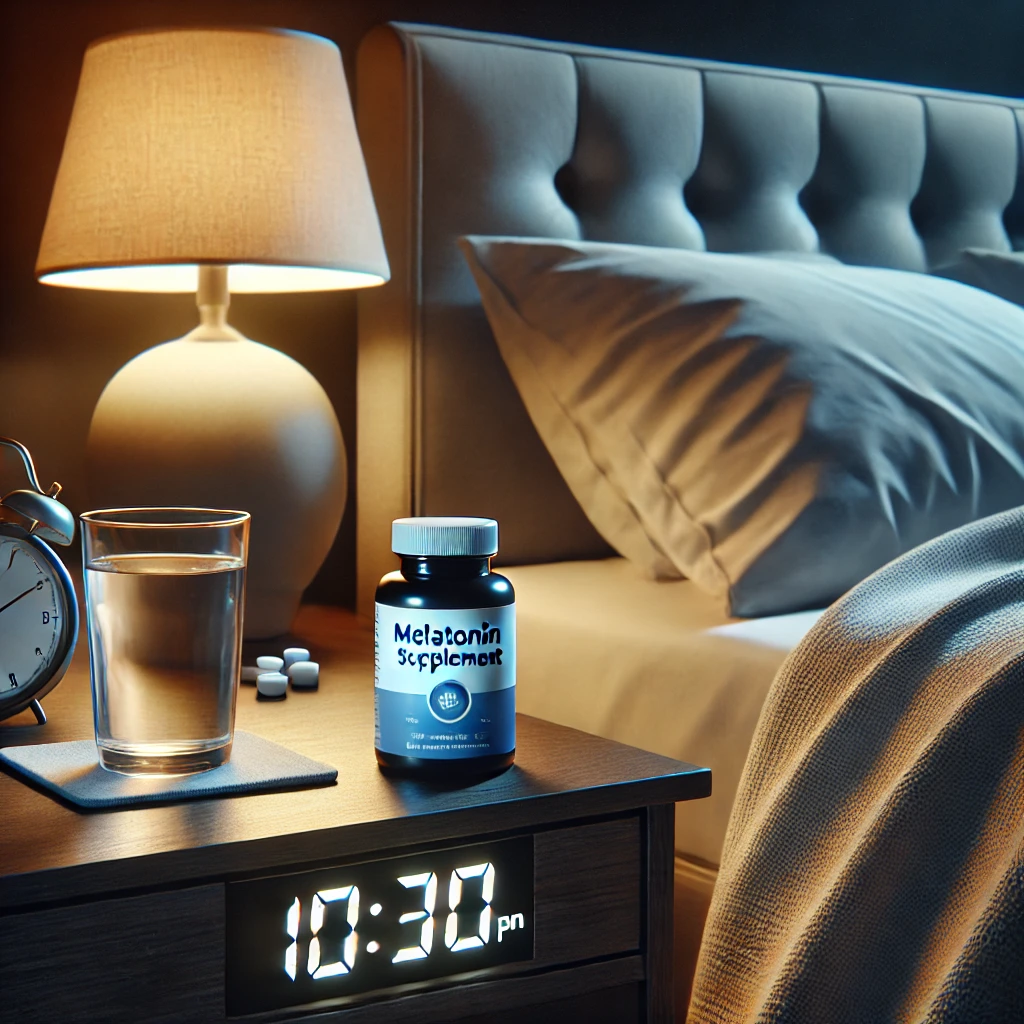Introduction
Melatonin has become a popular supplement for those looking to improve their sleep. From addressing insomnia to helping with jet lag, melatonin can be a helpful aid for many facing sleep challenges. However, understanding the right dosage is crucial to ensure safe and effective use. This guide explores proper dosages for different age groups, how to avoid taking too much, and when to consult a healthcare provider before using melatonin.
What Is Melatonin and How Does It Work?
Melatonin is a hormone naturally produced by the pineal gland in the brain. It plays a crucial role in regulating the sleep-wake cycle, often referred to as the body’s internal clock. Melatonin levels naturally rise in the evening, signaling to the body that it’s time to sleep, and decrease in the morning to help you wake up. Melatonin supplements mimic this natural process, making them useful for people who struggle with falling or staying asleep.
Common Uses of Melatonin Supplements
Melatonin supplements are primarily used to help with:
- Insomnia: Assisting those who have trouble falling or staying asleep.
- Jet Lag: Adjusting the sleep cycle when traveling across time zones.
- Shift Work Sleep Disorder: Helping people who work night shifts or irregular hours align their sleep patterns.
- Other Uses: Potential benefits in managing anxiety or delayed sleep phase disorder.
Recommended Melatonin Dose for Adults
Most adults take between 1 to 5 milligrams of melatonin, around 30 minutes before bedtime. It’s generally recommended to start with a lower dose and increase it if necessary, as lower doses can be just as effective as higher ones. Factors like sensitivity to melatonin, age, and other health conditions can influence the ideal dose for each individual.
Dosage Guidelines for Short-term Use
For occasional sleeplessness, a dose of 1-3 milligrams can be effective. If this does not improve sleep quality, the dose can be gradually increased, but it should not exceed 10 milligrams at a time. Starting with a smaller amount helps to assess how your body reacts before considering higher doses.
How Much Melatonin Should Older Adults Take?
Older adults over 65 should approach melatonin supplements with caution. The use of melatonin in this age group has not been extensively studied, and it may come with additional risks. Experts recommend using the lowest effective dose for the shortest possible duration and consulting a doctor before starting melatonin supplements.
Melatonin Dosage for Children: What Parents Should Know

Melatonin can be a helpful sleep aid for children, especially those with conditions like ADHD or autism, but it should be used with care. The dosage typically depends on the child’s age:
- Preschoolers: 1-2 milligrams.
- School-aged Children: 1-3 milligrams.
- Adolescents: 1-5 milligrams.
Before considering melatonin, parents should try non-medicinal strategies, such as setting a consistent bedtime routine, limiting screen time before bed, and ensuring a comfortable sleep environment. Always consult a pediatrician before giving melatonin to children to ensure safety and effectiveness.
Potential Impact of Melatonin on Children’s Development
Since melatonin is a hormone, there are concerns about how it might affect a child’s hormonal development when used long-term. While short-term use has been deemed safe for many children, the long-term effects remain uncertain. This makes it essential to seek medical advice before starting melatonin for sleep issues in kids.
Signs of Taking Too Much Melatonin
Excessive melatonin can lead to various side effects, including headaches, dizziness, nausea, and drowsiness. Some may experience vivid dreams or even nightmares. While melatonin is not likely to be fatal, taking too much can lead to an uncomfortable experience and disrupt your sleep cycle.
Can You Overdose on Melatonin?
Though melatonin is generally safe, it is possible to take too much. Overdose symptoms may include extreme drowsiness, headaches, and changes in blood pressure. While adults might experience discomfort from high doses, the risk of overdose is particularly concerning for children. The increase in melatonin use among kids has led to more cases of accidental overdoses, which is why dosage should always be carefully monitored.
What To Do in Case of a Melatonin Overdose
If you or your child show signs of a melatonin overdose, such as excessive sleepiness or difficulty waking, seek medical attention. In such cases, it’s crucial to follow medical guidance and avoid further supplementation until advised otherwise.
Safety Tips for Using Melatonin Supplements
- Avoid Combining with Alcohol and Caffeine: Both substances can interfere with melatonin’s effectiveness and disrupt sleep.
- Choose Reputable Brands: Since melatonin is not tightly regulated by the FDA, it’s important to purchase from reputable manufacturers to ensure product quality.
- Consult Healthcare Providers: Always speak with a healthcare provider before starting melatonin, especially if you have existing health conditions or are taking other medications.
Alternatives to Melatonin for Better Sleep
Melatonin isn’t the only solution for sleep troubles. Consider these alternatives:
- Behavioral Strategies: Establishing a consistent bedtime routine and avoiding screens before bed.
- Natural Alternatives: Herbal teas like chamomile or supplements like valerian root.
- Lifestyle Adjustments: Regular exercise, a balanced diet, and maintaining a comfortable bedroom environment can greatly improve sleep quality.
When Should You Consider Melatonin for Sleep Problems?
Melatonin may be helpful when other methods have not worked, particularly for jet lag or shift work sleep disorder. However, it’s important to address any underlying sleep issues, such as stress or lifestyle factors, to determine if melatonin is the right choice. Using melatonin in combination with healthy sleep habits can provide the best results.
Key Takeaways for Melatonin Dosage
- Melatonin can be a useful tool for improving sleep, but finding the right dosage is essential.
- For adults, starting with 1-2 milligrams before bed is recommended.
- Children and older adults should use melatonin under the guidance of a healthcare professional.
- Avoid exceeding 10 milligrams and watch for signs of overuse.
FAQs About Melatonin Dosage
When should I take melatonin?
Take melatonin about 30 minutes before your desired bedtime for best results.
How much melatonin should I take for jet lag?
Most experts suggest 0.5 to 3 milligrams for jet lag. Start with a low dose and adjust if needed.
Is melatonin safe during pregnancy or breastfeeding?
Melatonin has not been widely studied in pregnant or breastfeeding women, so it’s best to avoid it during these periods.
Can melatonin interact with other medications?
Yes, melatonin can interact with medications like blood thinners and immune suppressants. Always consult a doctor before combining it with other treatments.
What is the best form of melatonin: gummies, tablets, or liquid?
The choice depends on personal preference. Gummies are often popular, but tablets and liquid forms can be effective as well. Choose a product that suits your needs and consult a doctor for recommendations.
Conclusion
Melatonin can be a helpful supplement for improving sleep, but it’s important to use it responsibly. By starting with a low dose and adjusting as needed, you can find the right amount to support your sleep without the risk of overuse. For personalized advice, always consult a healthcare professional, especially when considering melatonin for children or older adults.
If you’re looking to improve your sleep quality with melatonin, consider purchasing from our shop, DreamTech Sleep. We offer high-quality, carefully formulated melatonin supplements that are designed to help you get the rest you need. Our products are third-party tested for purity and potency, ensuring that you’re getting a safe and effective dosage.


